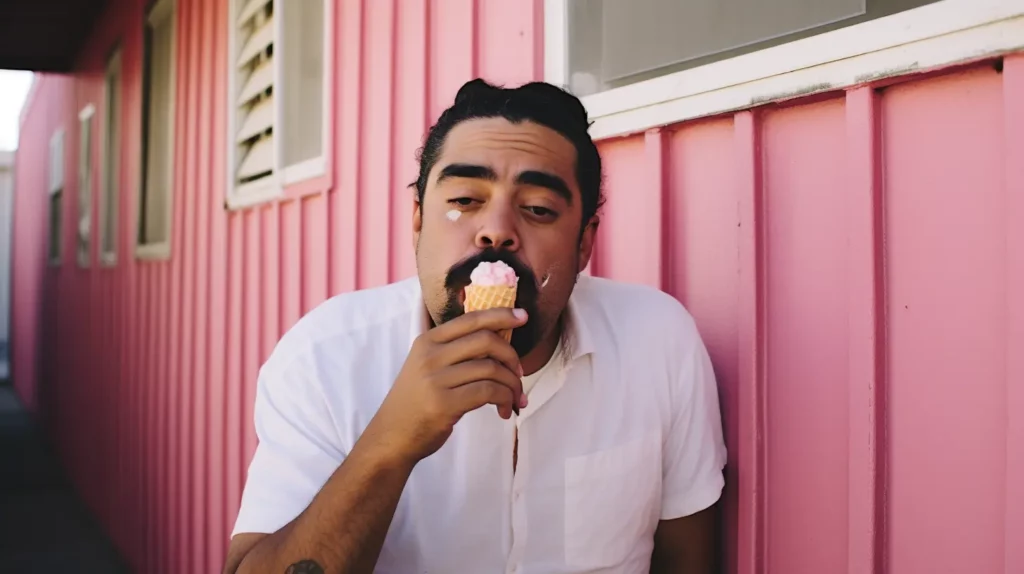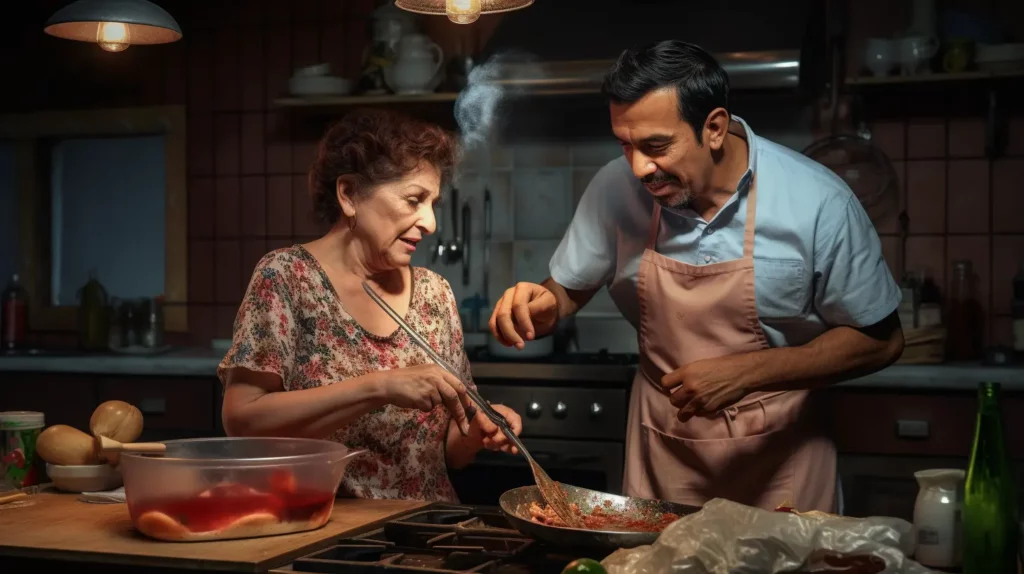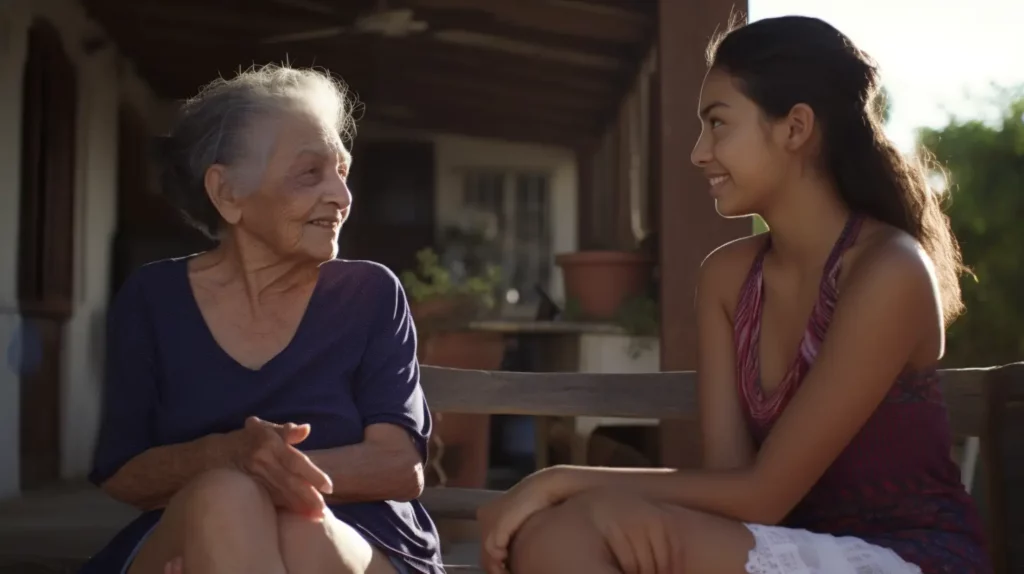Were you studying until late? Yes, I was…
¿Estabas estudiando hasta tarde? Sí, estaba…

You knuckled down and did some hardcore studying. As a result, you’re now feeling quite confident with the present tense and rather chuffed with yourself一 and rightly so!
What if you are itching to tell everyone at work about the exciting things you did at the weekend?
Then the present tense just isn’t going to cut it. You now need a new tense, the past progressive or past continuous.
What exactly do I mean by the past progressive or past continuous?
This tense will help you to describe actions and events that have already taken place. With the help of this tense, you will be able to form sentences like these:
Examples:
- What were you doing?
¿Qué estabas haciendo?
- I was eating ice cream this morning
Yo estaba comiendo helado esta mañana

- We were walking in the park
Nosotros estábamos caminando por el parque

The past progressive tense is a major verb form in Spanish. It may look a little tricky, but there are plenty of tips and tricks coming up that will help you to master it. Getting this tense secure under your belt will help you take your Spanish to a whole new level.
So, what’s in store for you in this guide?
In this article we will cover:
- What is the past progressive tense in Spanish?
- When should you use the past progressive tense?
- Past actions
- Interrupted ongoing actions
- Imperfect progressive formula
- Regular verbs
- Practice time
- Final words
- Answers
The past progressive tense will help you to confidently relate details about things that have already occurred. Get ready to tell stories and share past experiences with the help of this guide!
Let’s jump right to it!
What is the past progressive tense in Spanish?
The past progressive tense expresses a continued, repeated action that took place in the past but was interrupted. It is unlike the preterit tense as that is used for completed actions.
The English equivalent of this tense is: personal pronoun + “was/were” doing something.
If you are struggling to make heads or tails of the past progressive tense, don’t worry. Here I have a couple of example sentences that should help you get a better feel for it.
Examples:
- Were you eating breakfast?
- Was she dancing in her room yesterday?
- Were you dreaming about squirrels again?
Please note that these are rhetorical questions, but if you need any advice about any squirrel-related dreams, please drop me a comment.
Let’s now take a look at some English sentences with a Spanish translation in the past progressive tense.
Examples:
- I was singing my favorite song when you called
Yo estaba cantando mi canción favorita cuando llamaste

- I was talking to my boyfriend
Yo estaba hablando con mi novio
- I was cooking dinner with my mom
Yo estaba cocinando la cena con mi mamá

- She was walking her dog
Ella estaba paseando a su perro

When should you use the imperfect progressive tense?
I get it. It’s easy to get confused between the imperfect progressive and the preterit tense in Spanish. So with that in mind, the next section will help to make it crystal clear when you should use the imperfect progressive. This will save us from umming and ahhing the next time we want to express ourselves in the past tense.
Past actions
When the sentence describes what was happening during a period of time but without any emphasis or implication about a specific start or end.
Examples:
- My children were playing in the garden
Mis hijos estaban jugando en el jardín

- María was playing the piano
Maria estaba tocando el piano
Interrupted ongoing actions
When another action interrupts an action that was ongoing. This interrupting action is normally expressed in the simple past or the preterit tense.
What if you’re not too sure what an ongoing interrupted action is?
Then take a look at the following examples that should make it a lot clearer.
Examples:
- He was washing his car when his girlfriend arrived
Él estaba lavando su carro, cuando su novia llegó

- When Andy arrived home, Laura was talking to her mom
Cuando Andy llegó a la casa, Laura estaba hablando con su mamá

Past progressive formula
There’s nothing worse than gearing yourself up to explain something that happened in Spanish then forgetting how to construct your sentences properly. That’s why we need a super-simple formula that will help us create sentences without hesitation.
Luckily, this tense is far easier than forming the preterit past tense. So hold on tight as we take a look at a dead easy way of putting together sentences about the past.
The Spanish imperfect progressive is formed with the imperfect indicative “estar” + gerund. This is how to put together the imperfect indicative:
| Subject pronouns | Imperfect indicative estar |
| Yo | Estaba |
| Tú | Estabas |
| Él, Ella, Usted | Estaba |
| Nosotros/Nosotras | Estábamos |
| Ustedes, Ellos/Ellas | Estaban |
Regular verbs
For regular “-ar” verbs, use the following table to help you conjugate. Don’t forget the imperfect indicative “estar”!
| Subject Pronouns | Imperfect indicative estar | Gerund |
| Yo | Estaba | Hablando |
| Tú | Estabas | Hablando |
| Él, Ella, Usted | Estaba | Hablando |
| Nosotros/Nosotras | Estábamos | Hablando |
| Ustedes, Ellos/Ellas | Estaban | Hablando |
For regular “-er” and “-ir” verbs, the conjugations are slightly different. Here is an example using the verb “comer”:
| Subject Pronouns | Imperfect indicative estar | Gerund |
| Yo | Estaba | Comiendo |
| Tú | Estabas | Comiendo |
| Él, Ella, Usted | Estaba | Comiendo |
| Nosotros/Nosotras | Estábamos | Comiendo |
| Ustedes, Ellos/Ellas | Estaban | Comiendo |
Sometimes examples are better at explaining things than formulas are. So, let’s have a look at this grammar in its context.
In these examples, you will see some imperfect progressive sentences in English and Spanish. Unlike the preterit, these actions tell you what the subject was doing and emphasize that the action was interrupted.
Examples:
- Susana was talking to her mom
Susana estaba hablando con su mamá
- We were talking to your friends
Nosotros estábamos hablando con tus amigos
- She was taking a shower when you got there
Ella estaba tomando una ducha, cuando llegaste.
- He was eating a hamburger
Él estaba comiendo una hamburguesa
- You were eating vegetables when the dessert arrived
Ustedes estaban comiendo verduras cuando llegó el postre
- They were reading a book at the library
Ellos estaban leyendo un libro en la biblioteca
Practice time
Now it’s time for you to test what you’ve learned by completing the following exercises!
Exercise 1: Fill in the blanks with the correct form of past progressive, according to the subject
- Yesterday, the boys were reading the newspaper
Ayer los chicos ________ (leer) el periódico
- Last week I was running in the park with my dog
La semana pasada ________ (correr) en el parque con mi perro
- We were listening to the radio this morning
Nosotros _________ (escuchar) la radio esta mañana
- Laura and Esteban were learning Spanish last week
Laura y Esteban _________ (aprender) español la semana pasada
- Were you talking on the phone this morning
¿Tú ______ (hablar) por teléfono está mañana?
- My dad was working until 8 pm today
Mi papá ______ (trabajar) hasta las 8 pm hoy
- Were you reading the new book by your favorite writer?
¿_________ (leer) el nuevo libro de tu escritor favorito?
Note: The answers are at the end of the article.
Exercise 2: Translate the following sentences
- This morning I was cooking breakfast with my mom
_____________________________________ (cocinar)
- My sister was buying a new pair of shoes two days ago
____________________________________ (comprar)
- I was driving my new car to the mall
___________________________________ (conducir)
- My friends were drinking beer last night when they arrived at the club
___________________________________ (beber)
- Was she writing a letter to her boyfriend a couple hours ago?
¿____________________________________ (escribir)?
Note: The answers are at the end of the article.
Final words
You have reached another important milestone in Spanish grammar. Now that you are more familiar with the past progressive tense, you will be able to relate events that have happened in the past.
But as with every part of Spanish grammar, practice is the key! So make sure you revisit this guide and replay the audios that will help you consolidate what you have learned.
But what if you find you just cannot get motivated to study on your own?
Then why not get involved in some of our one-on-one classes? We’ll be happy to help you master the past progressive and any other portion of the language that you are struggling with!
Finally, Spanish teachers worth your time!
Experience the LingoToGo difference for yourself with a free week of unlimited lessons.
Expert teachers, raving students, guaranteed fun.
No credit card required. No obligation.
Free trial only available in the Americas and Europe. If you are in another region, you can sign up for one week of unlimited Spanish lessons for one dollar. Here’s the link to sign up for $1.
Answers
Here are the answers to both of the exercises in this past progressive tense guide.
Exercise 1: Fill in the blanks with the correct form of past progressive, according to the subject
1. Yesterday, the boys were reading the newspaper
Ayer los chicos estaban leyendo el periódico
2. Last week I was running in the park with my dog
La semana pasada estaba corriendo en el parque con mi perro
3. We were listening to the radio this morning
Nosotros estábamos escuchando la radio esta mañana
4. Laura and Esteban were learning Spanish last week
Laura y Esteban estaban aprendiendo español la semana pasada
5. Were you talking on the phone this morning
¿Tú estabas hablando por teléfono está mañana?
6. My dad was working until 8 pm today.
Mi papá estaba trabajando hasta las 8 pm hoy
7. Were you reading the new book of your favorite writer?
¿Estabas leyendo el nuevo libro de tu escritor favorite?
Exercise 2: Translate the following sentences
1. This morning I was cooking breakfast with my mom
Esta mañana estaba cocinando el desayuno con mi mamá
2. My sister was buying a new pair of shoes two days ago
Mi hermana estaba comprando un nuevo par de zapatos hace dos días
3. I was driving my new car to the mall
Yo estaba conduciendo mi nuevo carro al centro comercial
4. My friends were drinking beer last night when they arrived at the club
Mis amigos estaban bebiendo cerveza anoche cuando llegaron al club
5. Was she writing a letter to her boyfriend a couple hours ago?
¿Ella estaba escribiendo una carta a su novio hace algunas horas?

